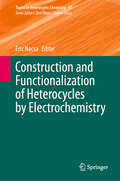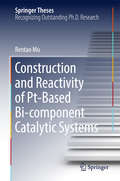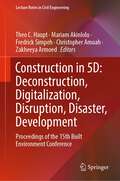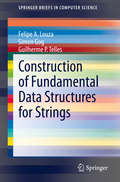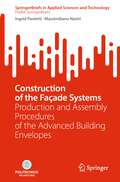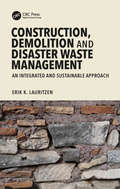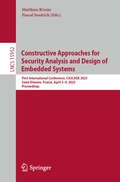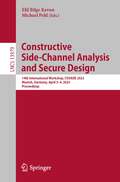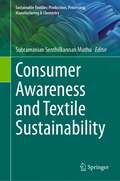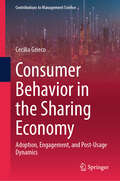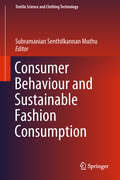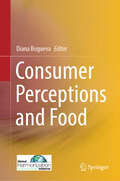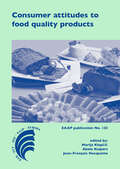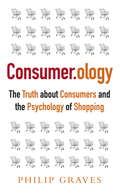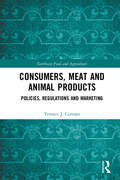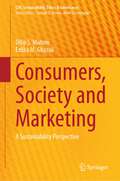- Table View
- List View
Construction Principles and Controllable Fabrication of 3D Graphene Materials (Springer Theses)
by Cheng TangThis book introduces the synthesis and modification of 3D hierarchical porous graphene materials and presents various applications of it. By directly constructing a 3D graphene framework with sp2 hybridization and hierarchical porosity, this book is aimed to bridge the gap between 2D ideal nanostructure and 3D practical materials by systematically studying the growth mechanism, synthetic methodology, customized application, and system promotion of 3D hierarchical porous graphene (hpG) materials. The achievements presented offer a valuable contribution to the fundamental research and the industrial development of graphene with significantly improved performance and also inspire further research into various nanomaterials beyond graphene.
Construction Technology: Trainee Guide (Third Edition)
by NccerThis curriculum is ideal for programs formatted as Construction Cluster or Building Trades. It consists of modules compiled from five existing NCCER programs. • 425 Hours (Includes 72.5 hours of Core Curriculum, which is a prerequisite for completion and must be purch This exceptionally produced trainee guide features a highly illustrated design, technical hints and tips from industry experts, review questions and a whole lot more!
Construction Technology: Trainee Guide (Third Edition)
by NccerThis curriculum is ideal for programs formatted as Construction Cluster or Building Trades. It consists of modules compiled from five existing NCCER programs. • 425 Hours (Includes 72.5 hours of Core Curriculum, which is a prerequisite for completion and must be purch This exceptionally produced trainee guide features a highly illustrated design, technical hints and tips from industry experts, review questions and a whole lot more!
Construction and Demolition Debris (Waste Management Principles and Practice)
by Timothy G. Townsend Malak AnshassiThis book addresses one of the major solid waste streams resulting from modern society, construction and demolition debris (CDD). CDD in the past has not received the same attention as other waste streams (e.g., municipal solid waste), but with the growing recognition of the environmental and economic importance of proper CDD management, this material now is the focus of attention of many government agencies and private businesses. This book provides a comprehensive review of CDD, its characteristics, environmental risks, and regulatory requirements, along with an in-depth discussion of the issues pertaining to CDD recycling and disposal.
Construction and Functionalization of Heterocycles by Electrochemistry (Topics in Heterocyclic Chemistry #61)
by Eric NacsaThis book highlights a selection of recent electrochemical approaches to synthesize heterocyclic compounds. Electrochemistry has recently re-emerged as a prevalent technique to promote synthetic organic reactions. This renewed interest arises from its sustainability as well as its ability to engage compounds in unique ways that complement conventional chemical reagents. In the context of heterocyclic synthesis, electrochemistry enables the annulation of simple precursors and the direct functionalization and elaboration of heterocycles, which are the focus of this volume. The primary target audience includes synthetic chemists at all levels of industry and academia.
Construction and Reactivity of Pt-Based Bi-component Catalytic Systems (Springer Theses)
by Rentao MuIn this thesis, the author outlines the construction of active structure and modulation of catalytic reactivity of Pt-based bi-component catalysts, from the model systems to real supported catalysts. The thesis investigates the promotion effect of the second components on catalytic performance of Pt catalysts, and presents the reversible generation of the "sandwich-like" structure of Pt-Ni catalysts, containing both surface NiO1-X and subsurface Ni by alternating redox treatments at medium temperature. With the aid of single layer graphene, the dynamic process of chemical reactions occurring on the Pt(111) surface can be visualized using in-situ LEEM and DUV-PEEM techniques, the results of which are included here. The author reveals that the graphene layer exhibits a strong confinement effect on the chemistry of molecules underneath and the intercalated CO can desorb from the Pt surface around room temperature and in UHV, which may promote the CO oxidation confined under graphene.
Construction in 5D: Proceedings of the 15th Built Environment Conference (Lecture Notes in Civil Engineering #245)
by Theo C. Haupt Mariam Akinlolu Fredrick Simpeh Christopher Amoah Zakheeya ArmoedThis book gathers the latest advances, innovations, and applications in built environment, as presented by international researchers at the 15th Built Environment Conference, held in Durban, South Africa, on September 27-28, 2021, and organized by the Association of Schools of Construction of Southern Africa (ASOCSA). The overarching theme of the conference was “Construction in 5D: Deconstruction, Digitalization, Disruption, Disaster, Development”, with contributions focusing on current trends, innovations, opportunities and challenges, policies and procedures, legislation and regulations, practices and case studies, in both the public and private sectors. The volume will contribute to the existing body of knowledge relative to the science and practice of construction not only in South Africa but wherever the products of construction are produced even in these new challenging times of fear and uncertainty.
Construction of Fundamental Data Structures for Strings (SpringerBriefs in Computer Science)
by Felipe A. Louza Simon Gog Guilherme P. TellesThis books reviews recent theoretical and practical advances on suffix sorting and introduces algorithmic solutions to problems of wide interest for the construction of fundamental data structures that operate efficiently on strings namely, constructing the suffix array, the longest common prefix (LCP) array, the document array and the Lyndon array. These data structures are the cornerstone of many algorithmic solutions in Bioiformatics, Information Retrieval and Data Compression. This book introduces the relevant problem areas, their importance, the notation and related algorithms and then presents the algorithmic solutions for indexing data structure constructions.This book is intended for graduate students, researchers and practitioners from Computer Science and Bioinformatics with a strong interest in algorithmic aspects.
Construction of the Façade Systems: Production and Assembly Procedures of the Advanced Building Envelopes (SpringerBriefs in Applied Sciences and Technology)
by Ingrid Paoletti Massimiliano NastriThe book explores the advanced façade systems according to the productive and constructive contents, in a cognitive and operative form, as a manual text to provide guidelines for researchers, technicians and professionals. It provides operational guidance for the technological design, production planning and site executive coordination for the realization of façade systems. The analysis deals with the main building elements and technical interfaces. The study of the façade systems, after explaining the anchoring structures and their connections to the load-bearing elements, investigates the criteria for the assembly between the framings. In particular, the book examines the technical interfaces of the main advanced envelope systems with respect to the functional, constructive and applicative coordination procedures of the mullions and transoms framing, of the structural sealant glazing façade system, of the unit façade system, of the suspended façade system and of the double skin façade system. The technical and manual character of the book is also expressed through the analysis of the functional and application procedures of the gaskets with respect to the façade systems in order to prevent the transmission of air and water loads: the analysis focuses on the connections between the framing and the enclosure elements of the envelope, in accordance with the compensation of height differences in order to guarantee impermeability, airtightness and insulation. Then, the book describes the assembly and interface conditions between elements of different composition and production within the façade systems: the examination of the technical interfaces involves the development and application of sealants, based on the loads exerted on the jointing devices, in order to fulfill the requirements of sealing and tightness with respect to mechanical, thermal and hygrometric, water, air and wind stresses. Moreover, the study of the envelope systems examines the methodologies directed toward fulfilling the requirements with respect to the actions caused by fire loads, considering the contents related to both components and connections and fixing surfaces.
Construction, Demolition and Disaster Waste Management: An Integrated and Sustainable Approach
by Erik K. LauritzenConstruction and Demolition Waste (CDW), from the construction, maintenance, renovation and demolition of buildings and structures, represents a large proportion of the waste in industrialized societies. Compared to other forms, such as household waste, more than 90% of CDW can be used as a resource and a substitute for construction materials, especially for primary, natural raw materials. Reuse, recovery and recycling depends on the quality and market for the materials, and the environmental impact of the processes for conversion of CDW from old structures to its use in new structures. However, the utilization today of CDW products as secondary resources is marginal. Most CDW is deposited or used as fill material, and the opportunities of high quality recycling are generally neglected. This book presents the opportunities for the sustainable and resource efficient utilisation of CDW, focusing on recycling of concrete and masonry as the major forms of CDW. The recycling of gypsum, timber, mineral wool, asphalt and other types are also described. Its aim is to present a chain of value and material streams in the transformation of obsolete buildings and structures into new buildings and structures. It takes a holistic view, focusing on the lifecycle economy (the circular economy) and integrated management aspects of various scenarios ranging from high industrial urban renewal to debris removal and management after disasters and conflicts. It is based on the author´s 35 years of research and development combined with practical international experience within the demolition and recycling area. It addresses students, architects, civil engineers, building owners, public authorities and others working in urban planning, demolition and resource management in the building and construction sector and in the reconstruction of damaged buildings after disasters and wars.
Constructional Viscoelastic Composite Materials: Theory and Application
by Pouria Hajikarimi Alireza Sadat HosseiniViscoelasticity is a complicated theorem that is generally used in several aspects of material characterization and modeling of polymers, resins, fiber-reinforced composites, bituminous composites, etc. On the other hand, the heterogeneous nature of composites like asphalt concrete and fiber-reinforced polymers has motivated lots of researchers to investigate the mechanical and rheological properties of these materials. This book mainly consists of the theory and application of viscoelastic materials used for construction. It starts with a comprehensible presentation of the theory of linear and nonlinear viscoelasticity. Wherein, the application of viscoelastic equations and principles on constructional viscoelastic composite materials considering time, temperature, loading rate dependency, and heterogeneity of composite substances is highlighted. The principles and equations of the viscoelasticity theorem are presented in several books, but here it is tried to present them more understandable and straightforwardly. This helps in solving real problems of heterogeneous composite materials, especially those which are used in construction. Moreover, the fundamental experiments for characterizing the elastic and viscoelastic properties of fibrous and bituminous composites are introduced and summarized. Then after, some analytical and empirical formulations for deriving the material properties of composites from the properties of the basic constituents are presented. These are followed by numerical simulation techniques using the finite element method to simulate composite materials.
Constructive Approaches for Security Analysis and Design of Embedded Systems: First International Conference, CASCADE 2025, Saint-Etienne, France, April 2–4, 2025, Proceedings (Lecture Notes in Computer Science #15952)
by Matthieu Rivain Pascal SasdrichThis book constitutes the refereed proceedings of the First International Conference on Constructive Approaches for Security Analysis and Design of Embedded Systems, CASCADE 2025, held in Saint-Etienne, France, during April 2–4, 2025.The 24 full papers included in this book were carefully reviewed and selected from 51 submissions. They are organized in topical sections as follows: Attacks on Symmetric Cryptography; Side-Channel Attacks; Physical Security; RISC-V; Machine Learning; Attacks on Post-Quantum Cryptography; Securing Post-Quantum Cryptography; Homomorphic Encryption and White-Box Cryptography; Attacks on Symmetric Cryptography; Side-Channel Attacks; Physical Security; RISC-V; and Machine Learning.
Constructive Fractional Analysis with Applications (Studies in Systems, Decision and Control #362)
by George A. AnastassiouThis book includes constructive approximation theory; it presents ordinary and fractional approximations by positive sublinear operators, and high order approximation by multivariate generalized Picard, Gauss–Weierstrass, Poisson–Cauchy and trigonometric singular integrals. Constructive and Computational Fractional Analysis recently is more and more in the center of mathematics because of their great applications in the real world. In this book, all presented is original work by the author given at a very general level to cover a maximum number of cases in various applications. The author applies generalized fractional differentiation techniques of Riemann–Liouville, Caputo and Canavati types and of fractional variable order to various kinds of inequalities such as of Opial, Hardy, Hilbert–Pachpatte and on the spherical shell. He continues with E. R. Love left- and right-side fractional integral inequalities. They follow fractional Landau inequalities, of left and right sides, univariate and multivariate, including ones for Semigroups. These are developed to all possible directions, and right-side multivariate fractional Taylor formulae are proven for the purpose. It continues with several Gronwall fractional inequalities of variable order. This book results are expected to find applications in many areas of pure and applied mathematics. As such this book is suitable for researchers, graduate students and seminars of the above disciplines, also to be in all science and engineering libraries.
Constructive Processing of Microwave and Optical Data for Hydrogeochemical Applications
by Vladimir F. Krapivin Costas A. Varotsos Ferdenant A. Mkrtchyan Yong XueThis book presents results of the combined use of microwave remote sensing, optical tools, and ecoinformatics methods under solution-applied tasks at both regional and global scales. Ecoinformatics methods are used to assess links between global climate change and the level of ocean pollution, with specific focus on the Arctic Ocean, the Sea of Okhotsk, and the South-China Sea. The theoretical and applied aspects of instrumental tools are considered in this book as a basis for the monitoring of water quality in various watersheds, with particular attention to microwave remote sensing monitoring data to determine the ecotoxicological status of hydro-ecosystems affected by climate change. The book develops new information technologies that provide solutions for hydrochemical tasks using algorithms and models based on computer technologies for big data processing. This will help to synthesize effective computer-based systems for the solution of problems arising due to anthropogenic impacts on hydrological processes and objects at various spatial scales. This book is intended for specialists in the fields of environmental monitoring, climate change, human-nature interactions, and geopolitics. The book will be useful for undergraduate and postgraduate students studying these fields of science as well.
Constructive Side-Channel Analysis and Secure Design: 14th International Workshop, COSADE 2023, Munich, Germany, April 3–4, 2023, Proceedings (Lecture Notes in Computer Science #13979)
by Elif Bilge Kavun Michael PehlThis book constitutes the refereed proceedings of the 14th International Workshop on Constructive Side-Channel Analysis and Secure Design, COSADE 2023, held in Munich, Germany, during April 3–4, 2023. The 12 full papers included in this book were carefully reviewed and selected from 28 submissions. They were organized in topical sections as follows: fault-injection analyses and countermeasures; side-channel analyses and countermeasures; attacks on PQC and countermeasure; and analyses and tools.
Constructive Side-Channel Analysis and Secure Design: 15th International Workshop, COSADE 2024, Gardanne, France, April 9–10, 2024, Proceedings (Lecture Notes in Computer Science #14595)
by Romain WacquezThis book constitutes the refereed proceedings of the 15th International Workshop on Constructive Side-Channel Analysis and Secure Design, COSADE 2024, held in Gardanne, France, during April 9–10, 2024. The 14 full papers included in this book were carefully reviewed and selected from 42 submissions. They were organized in topical sections as follows: Analyses and Tools; Attack Methods; Deep-Learning-Based Side-Channel Attacks; PUF/RNG; and Cryptographic Implementations.
Consumer Awareness and Textile Sustainability (Sustainable Textiles: Production, Processing, Manufacturing & Chemistry)
by Subramanian Senthilkannan MuthuThis contributed volume discusses how consumer awareness of textile sustainability can lead to a more sustainable textile supply chain. From the initial purchase of a textile to its care and longevity, consumer behaviors are at the core of consumption associated with the textile industry. Making consumers aware of the environmental impacts of the clothing products they buy help them to choose the best alternative which has the lowers footprints and also enable them to help the entire textile sector to become sustainable. In addition, making them aware of environmental footprints of textile products from cradle to grave, make them aware of how best they can take care of their products during use and disposal phases and how they can help to preserve the planet with their earnest efforts to reduce the environmental impacts in their boundary, i.e. the use and disposal phases.
Consumer Behavior in the Sharing Economy: Adoption, Engagement, and Post-Usage Dynamics (Contributions to Management Science)
by Cecilia GriecoThe book examines the essential aspects of consumer behavior within the sharing economy. This thorough analysis covers the pre-adoption, active usage, and post-adoption phases, offering a comprehensive view of the consumer journey. The research is based on an extensive literature review, highlighting key elements and emphasizing the consumer perspective through original quantitative and qualitative studies across various industries. Researchers will find the theoretical advancements and cutting-edge insights invaluable. Platform managers will gain a deeper understanding of consumer behavior, enabling them to refine strategies throughout the purchasing process. Marketing professors can use this book as a primary textbook or supplementary reading for their courses. Key topics include the drivers of adoption, trust issues, satisfaction, and user retention, along with theoretical frameworks that uniquely define the phenomenon of the sharing economy and the specificities of consumer behavior within this domain.
Consumer Behaviour and Sustainable Fashion Consumption (Textile Science and Clothing Technology)
by Subramanian Senthilkannan MuthuThis book analyses the importance of consumer behaviour in sustainable fashion and consumption. Consumer behaviour plays a major role in sustainability, and when it comes to textile products, a number of studies have shown that for certain product categories, consumer behaviour during use and disposal stages influences the entire life cycle impacts of the product more than the raw material and manufacturing stages. However green the production, the overall sustainability of a product depends on the consumers who use and dispose of it.
Consumer Perceptions and Food
by Diana BoguevaThis book is a timely overview of the various aspects of consumer perception related to food. This book explores consumer perceptions that are vital to marketers and often underlie the success or failure of products in the marketplace. Perception is the process of selecting, organizing, and interpreting sensations into a meaningful whole, and this book highlights how human perceptions are unique, highly subjective, and easily distorted. These perceptions are influenced by our senses—sight, hearing, taste, smell, and touch—as well as our beliefs, emotions, opinions, and experiences. This book states that this is related to food, and perceptions are also guided by beliefs, thoughts, emotions, feelings, and opinions about, or preferences, expectations, and knowledge of, and the sensory experience, the fear, and the relationships built between the consumers and the food over time. This book aims to further the understanding of the fundamental mechanisms which determine individual responses to existing and emerging food issues. This book provides insights into consumer behaviour (e.g. consumer decision making, promoting behaviour change), factors influencing consumers’ food and meal choices, confidence in the safety of food, perception of health-related messages and food laws and regulations, sustainable and responsible consumer behaviour (e.g. food waste), acceptability of new food alternatives, innovations and technologies, integrating consumer insight and communication challenges in cross-functional communications in innovation processes. "Consumer Perceptions and Food" delves into how these perceptions shape consumer behavior, from decision-making and behavior change to meal choices and confidence in food safety. It explores the impact of health-related messages, food laws, and regulations, and examines the acceptability of new food alternatives and technologies. The book also addresses the importance of sustainable and responsible consumer behavior, including food waste and ethical consumption. Through a rich array of insights, this book provides a deep understanding of the fundamental mechanisms that drive individual responses to food issues. It emphasizes the importance of mindful eating—making conscious food choices that benefit our health, the environment, and the planet. This involves considering the origins of our food, its production methods, and the broader impacts of our choices on public health and ecosystems. This book is a call to action for consumers to rethink their relationship with food, fostering deeper connections and appreciation for sustainable practices and ethical consumption. It is a crucial step in the ongoing journey of shaping the future of food, guided by informed and mindful consumers.
Consumer Society: Critical Issues & Environmental Consequences
by Barry SmartWhat factors are contributing to the continuing growth in consumption of goods and services? At what point do the costs associated with consumerism begin to call our way of life into question? How are the problems of resource depletion, waste and pollution, and environmental impact being addressed? What is to be done about the consequences of our all-consuming way of life?<P> Ever-increasing consumption and a relentless pursuit of growth in output are the twin pillars on which the modern economy and contemporary social life rest. But the consumer way of life is globally unsustainable. We can't all live the consumer dream. <P> This comprehensive, lively and informative book will quickly be recognized as a benchmark in the field. It brings together a huge set of resources for thinking about the development of consumer culture, its defining features, and global consequences. <P> Adept in handling a complex range of classical and contemporary theoretical sources, the book draws on an impressive range of comparative material and provides a variety of contemporary examples to inform and enhance understanding of our consuming way of life. Smart writes with verve and feeling and has produced a stimulating book that enlarges our understanding of consumer culture and provides a timely critical analysis of its consequences.<P> Clear, engaging, and original this book will be essential reading for all those interested in and concerned about our global culture of consumption including researchers and students in sociology, politics, cultural studies, economics, and social geography.
Consumer attitudes to food quality products: Emphasis On Southern Europe (European Association for Animal Production #133)
by Marija Klopčič Jean-François Hocquette Abele KuipersQuality foods, such as traditional, EU certified, organic and health claimed are part of a growing trend towards added value in the agri-food sector. In these foods, elements of production, processing, marketing, agro-tourism and speciality stores are combined. Paramount above all is the link to the consumer, which requires a personal approach. At this point, one enters the field of food consumer science. This can be seen as a hybrid of two distinct sciences. On one hand, there is the 'hardware' component, i.e. the science of food. On the other hand, the 'software' component, related to the science of consumers' preferences and behaviour. In animal science, nearly all attention is given to the 'hardware' aspect. However, to build a successful business in quality food products, the 'software' aspect is essential. This publication devotes special attention to the consumer and gives insight into an area of knowledge still very much in development. It is intended to enhance understanding of the complex relationships in the route from products to consumers and offers practical solutions in this field. This publication includes review articles covering basic aspects of food consumer science and research trends in the field, and a series of country reports and articles on relevant studies related to the topic, with emphasis on Southern Europe.
Consumerology, New Edition
by Philip GravesPhilip Graves, one of the world's leading experts in consumer behavior, reveals why the findings obtained from most market research are completely unreliable. Whether it is company executives seeking to define their corporate strategy or politicians wanting to understand the electorate, the idea that questions answered on a questionnaire or discussed in a focus group can provide useful insights on which to base business decisions is the cause of product failures, political blunders and wasted billions. Consumer.ology exposes some of the most expensive examples of research-driven thinking clouding judgment, experience and evidence - from New Coke to General Motors, from Mattel to the Millennium Dome - and instances of success through ignoring market research, such as Baileys and Doctor Who. It also shows organizations the tools they should be using if they want to understand their customers. Using his unique AFECT approach, a set of five criteria to evaluate the reliability of any consumer insight, Graves asserts that it's time for a fresh approach that embraces this new understanding of human behavior.
Consumers, Meat and Animal Products: Policies, Regulations and Marketing (Earthscan Food and Agriculture)
by Terence J. CentnerThis book addresses the production practices employed in the production of food animals and animal products that enable marketers to sell a variety of products to meet consumer demand. Food animal production practices have come under increased scrutiny by consumers who object to inputs and practices. The industry has been a proponent of using technologies to reduce production costs, resulting in lower-priced meat and animal food products, and now consumers are starting to look at other objectives. This book considers the key issues of concern to consumers, including the treatment of animals, the use of antibiotics, feed additives and hormones, and how these are monitored, regulated, and communicated to consumers. It also reviews labeling and information provided to consumers, including organic, genetic engineering, welfare standards, and place of origin. While the main focus is on the United States, there are descriptions of European practices and legislation. Overall, it aims to provide an objective and balanced appraisal, which will be of interest to advanced students and researchers in agricultural, food and environmental economics, law and policy, and animal production and welfare. It will also be very useful for early career professionals in the food and agricultural sectors.
Consumers, Society and Marketing: A Sustainability Perspective (CSR, Sustainability, Ethics & Governance)
by Dilip S. Mutum Ezlika M. GhazaliEnvironment and social responsibility are paramount for any modern business strategy, and the field of marketing is adapting itself to the new focus on sustainability. The study of the interface between consumers, society, and marketing is crucial for understanding the complex interactions between individuals and the products and services they consume and the resulting implications. In this book, the authors delve into the latest research and theories on the subject, providing insight into the various factors that shape consumer behavior and the broader impacts of marketing on society. Whether you are a student, professional, or simply curious about the topic, this book will provide a valuable resource for your learning and exploration. Instead of treating ethical foundations and critical marketing perspectives separately, this book merges them and takes a broader sustainability perspective. It examines the various ways in which businesses are incorporating sustainability into their marketing strategies, and the impact these efforts are having on consumers, the economy, and the planet. Topics covered in this book include: Evolution of marketing thoughtCritique of marketingSustainable marketingSocial marketingEvolving consumer representations and roles, and many more



